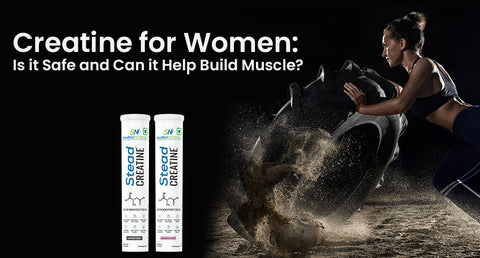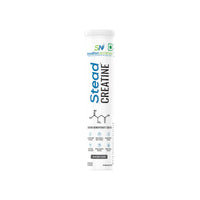Table of Content
Creatine is a chemical compound naturally produced by our body in the muscles and brain to regenerate ATP (adenosine triphosphate) for fuelling muscles with energy. In the recent years, it has also been used as a performance-enhancing supplement mostly popular amongst athletes, fitness enthusiasts and gym goers as it facilitates energy production in the form of ATP and improves endurance and strength. While traditionally associated with men, creatine for women is gaining a significant reputation in the fitness industry. It is a common misconception that creatine can bulk up a woman leading to significant weight gain. However, these myths are getting debunked of late as many popular female athletes and fitness influencers are now opening up about how incorporating creatine has enhanced their workout and overall performance.
Ultimately, creatine has properties that support workout goals without any gender bias and in this blog, we will explore why creatine for women is becoming an essential part of their fitness routines.
What is Creatine?
- Creatine is a naturally occurring nitrogenous compound made up of three amino acids: L-arginine, glycine and L-methionine. It is transported to the muscle cells in the body through blood to fuel them during workouts. It is naturally found in fish, poultry, and red meat and can also be taken through supplements.
- Creatine supplements act as a medium to produce explosive levels of energy during high-intensity workouts and strength training sessions. It also helps retain water in your muscle cells causing a pump effect.
Benefits of Creatine for Women
Women can take creatine supplements to achieve their targeted fitness goals.
1. Improves exercise performance:
During high-intensity exercises such as weightlifting or sprinting, the demand for energy increases by the muscles for better functioning. Creatine helps the body to produce ATP, providing fuel to muscle cells and enhancing endurance.
- That is when creatine gets converted into creatine phosphate which can donate its phosphate group to adenosine diphosphate (ADP) restoring adenosine triphosphate (ATP) to maintain energy levels, optimising exercise performance.
- Women in the post-menopausal stage may benefit by including creatine to support skeletal muscular size since it helps provide an optimal amount of energy to muscles for enhanced function, especially when combined with resistance training.
- Creatine helps enhance muscle hydration in women as it retains water in the cells of muscles, which improves muscle hydration and prevents muscle fatigue.
2. Promotes Muscle Gain:
Research has shown promising results that when combined with resistance exercise training, creatine promotes muscle gain by increasing levels of a hormone called IGF-I that increases muscle protein synthesis leading to a gain in muscle mass, which improves exercise performance.
3. Helps supply energy to muscles:
This is one of the best benefits of creatine for women: as creatine helps in refuelling ATP, it helps those women involved in weightlifting, powerlifting or any activity involving short bursts of intense energy.
4. Enhances endurance:
Creatine, when taken with carbohydrates, enhances the resynthesis of glycogen, an important energy store that supports any high-intensity aerobic exercise, enhancing endurance in women in sports such as cycling, swimming, and running to get the most out of any workout.
5. Benefits of creatine for women’s cognition and sleep:
Studies show that creatine consumption may enhance cognitive health - mainly short-term memory required to complete certain tasks - by promoting ATP supply to the brain.
How to Take Creatine as a Woman
1. Recommended daily dosage:
The creatine dosage for women and men for optimal results during the maintenance period is 3-5 g per day.
2. When to take creatine:
The best time to take creatine for women is 30 minutes before or after exercise training.
3. Creatine loading phase – Is it necessary for women:
The loading phase refers to the period where you take high doses of creatine for 5-7 days before moving to a lower dose. There is not much research done on a loading phase specific to women. Therefore, a creatine ‘loading’ phase is not needed until it is required to fulfil a specific goal of fitness, and then it can be consumed under the supervision of a healthcare professional.
- However, to load on creatine or not depends on individual preferences, as both methods, whether loading or gradually increasing intake, lead to increase in performance and improvement in muscle strength and endurance.
4. Choosing the best creatine supplement:
Choosing the best creatine for women can be a daunting task for those new to the fitness world. From its composition to its quality, creatine monohydrate is better than other forms of creatine. It has the best safety record, is scientifically backed as a supplement and has shown to be more effective than other forms of creatine (ethyl ester and liquid) in several research studies.
- Steadfast Nutrition’s Stead Creatine containing creatine monohydrate is the best creatine for women, men and every individual to enhance their fitness journey:
- Steadfast Nutrition’s SteadCreatine is a safe and effective creatine for women that can be used for increasing muscle strength and endurance.
- Each tablet of SteadCreatine contains 1500 mg of Creatine Monohydrate, which provides women with the energy and speed needed to perform high-intensity exercises.
- The International Society of Sports Nutrition (ISSN) states that creatine monohydrate is the most effective ergogenic nutritional supplement available among creatine supplements and is the best supplement for increasing high-intensity workout performance in addition to lean body mass.
Thus, it can be concluded that creatine monohydrate is the best creatine for women and also the best creatine for building muscle.
Common Myths About Taking Creatine
Myth: Creatine results in fat gain.
Fact: Creatine only causes temporary water retention which may result in small weight gain due to increased muscle volume. However, no additional fat mass is gained by taking creatine in a varied populations.
Myth: Creatine is an anabolic steroid.
Fact: Anabolic steroids are drugs, with a different chemical structure and legal ramifications than creatine. Creatine like many other dietary supplements is legal to possess without a physician’s prescription and there are no legal consequences for the possession or ingestion of creatine, unlike anabolic steroids.
Myth: Creatine causes kidney damage.
Fact: Experimental and controlled research indicates that creatine supplementation, when ingested at recommended dosages, does not result in kidney damage and/or renal dysfunction in healthy individuals. However, excess consumption may cause kidney dysfunction.
Myth: Creatine can only be taken by men.
Fact: Creatine supplementation has the potential to be a multifaceted fitness supplement across the lifespan in females, with little to no side effects.
Myth: Creatine makes you masculine.
Fact: Creatine cannot make women bulky or masculine - it is only a performance enhancer that can increase strength, tone muscles and give energy during high-intensity exercise.
Myth: Creatine causes hair loss
Fact: A study done in 2009 saw hair loss due to an increased amount of DHT (dihydrotestosterone) but this has been rejected as a concern for women as the research was done on only men with a specific gene. Hence, there are no prominent studies to show hair loss as a side effect of creatine on women.
Potential Side Effects of Creatine and Precautions
Side effects of creatine
- Water retention leads to temporary weight gain in muscles or bloating.
- Digestive discomforts, such as stomach cramps, nausea, or diarrhoea.
- Dehydration
- Irregularities in kidney or liver function if taken more than the prescribed dosage.
Precautions
Consult with a healthcare provider before taking creatine if you are: Pregnant or Breastfeeding: Using creatine when you are pregnant can be a safety concern in certain stages of pregnancy. Creatine should also be avoided if you are breastfeeding.
- Have pre-existing Medical Conditions: If you have any pre-existing kidney or liver disease, talk to a healthcare professional before using creatine.
- Are on medications: Professional advice from a healthcare practitioner is needed if you take medications, as certain drugs may interact with creatine or require dosage adjustments.
Conclusion
Creatine primarily enhances athletic performance in both women and men by increasing energy production in muscles, leading to improved strength and endurance. By understanding these facts and not falling for the myths, women can make informed decisions about incorporating creatine into their fitness regimen. Creatine is often associated with widespread usage among male athletes. It can be equally beneficial for women as well. However, any supplement is the most beneficial when taken with a well-balanced diet and a well-suited exercise plan. Hence, it can be concluded that creatine for women is as important and beneficial as it is for men.
FAQs
Q1. What type of creatine is best for women?
The best creatine for women is creatine monohydrate which increases muscle performance by fuelling them during high-intensity resistance training workouts.
Q2. Is creatine beneficial for older women?
Creatine can benefit both pre-menopausal as well as post-menopausal women. Benefits may be experienced through different dosages in both. Creatine may show better results in older women. However, taking creatine without consulting a healthcare professional may result in adverse effects. Hence, it is always advised to consult a medical professional before starting any supplement.
Q3. Do women need a loading phase for creatine?
There is no requirement for a loading phase for creatine in women until they’re competing in an event. It all depends on individual goals and preferences. Slow and gradual progress is often the most sustainable and successful.
Q4. When is the best time for women to take creatine?
Generally, taking creatine before or after a workout may maximise its benefits because that is when it is most needed for energy production and recovery. However, there is no consensus on the exact timing for taking creatine.
Q5. Is creatine safe for women?
Creatine for women is a safe supplement when taken in the recommended dosage alongside a healthy and balanced diet to enhance performance in both male and female athletes. However, women who are pregnant, have recently had a baby or have been diagnosed with a chronic disease are advised to avoid it.


